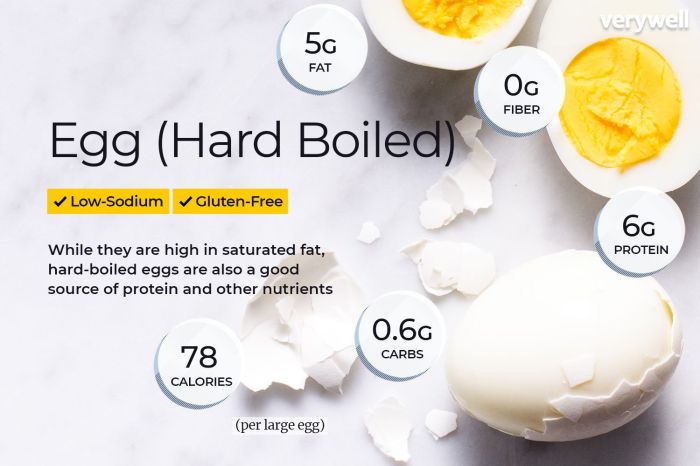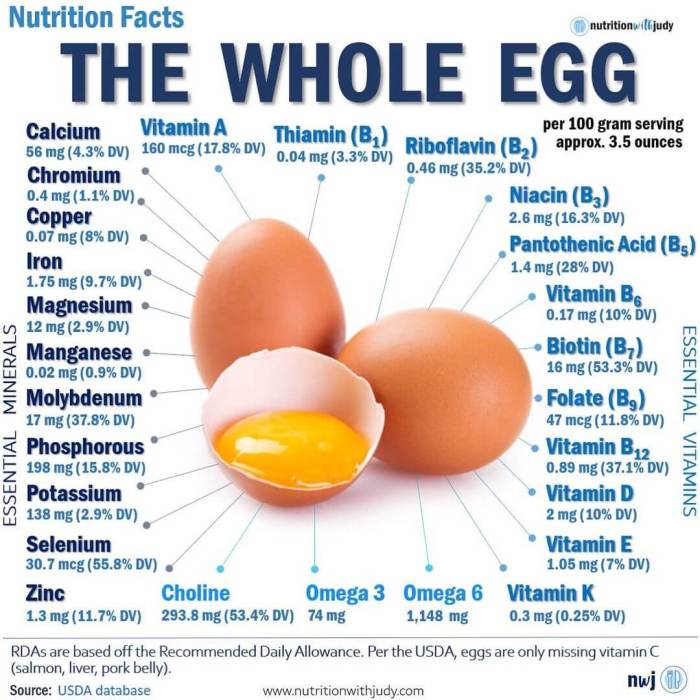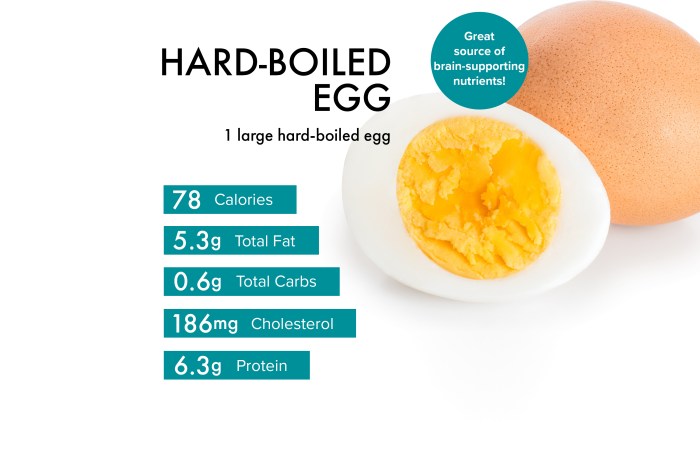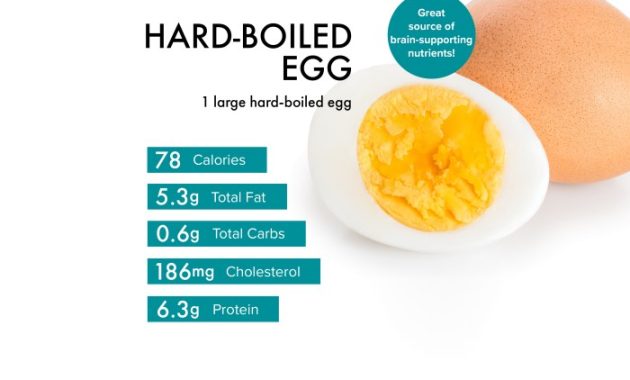Micronutrient Profile of Hard-Boiled Egg Whites

Hard boiled egg white nutrition information – The stark white of the egg, a pristine canvas of protein, holds more than just muscle-building blocks. Within this seemingly simple structure lies a surprisingly complex tapestry of micronutrients, each playing a vital, often unsung, role in the symphony of human health. These aren’t merely trace amounts; they contribute significantly to our daily nutritional needs, quietly bolstering our well-being.
Consider the egg white, not as a mere dietary component, but as a miniature apothecary, dispensing essential vitamins and minerals with each bite.
Vitamin and Mineral Content of Egg Whites
The following table details the micronutrient profile of a single large hard-boiled egg white, offering a glimpse into its nutritional richness. Note that the percentage of daily value (%DV) can vary depending on individual dietary needs and overall caloric intake. These values represent averages based on established dietary guidelines.
| Nutrient | Amount per Egg White | %DV | Unit |
|---|---|---|---|
| Riboflavin (Vitamin B2) | 0.1 mg | 6% | mg |
| Niacin (Vitamin B3) | 0.1 mg | 1% | mg |
| Vitamin B6 | 0.1 mg | 5% | mg |
| Vitamin B12 | 0.6 mcg | 24% | mcg |
| Selenium | 15 mcg | 22% | mcg |
| Potassium | 62 mg | 2% | mg |
| Phosphorus | 11 mg | 1% | mg |
| Iodine | Trace | <1% | mcg |
Micronutrient Roles in Health Maintenance
The vitamins and minerals present in egg whites contribute to various essential bodily functions. Riboflavin, for instance, is crucial for energy metabolism and maintaining healthy skin. Niacin plays a role in DNA repair and cell signaling. Vitamin B6 is vital for brain development and function, while the often-overlooked vitamin B12 is essential for nerve function and red blood cell formation.
Selenium acts as a powerful antioxidant, protecting cells from damage. Potassium contributes to maintaining healthy blood pressure, and phosphorus is essential for bone health and energy production. The trace amounts of iodine, while small, contribute to thyroid hormone production. Each nutrient, even in seemingly modest quantities, plays a significant role in the complex orchestration of human health.
Significant Micronutrients in Egg Whites
While all the micronutrients listed above contribute to overall well-being, vitamin B12 and selenium stand out in terms of their relative abundance in egg whites. A single egg white provides a significant portion of the recommended daily intake of vitamin B12, a nutrient often lacking in vegetarian and vegan diets. Similarly, the selenium content is noteworthy, given its potent antioxidant properties and role in immune function.
These two micronutrients highlight the nutritional value of this often-underestimated food. The body’s need for these vital components is often overlooked, yet their presence in a readily accessible and affordable food source like egg whites underscores their importance.
Health Benefits Associated with Hard-Boiled Egg White Consumption

The stark white of a hard-boiled egg, often overlooked in favor of its yolk-fellow, holds a nutritional punch surprisingly potent. While the yolk contributes significantly to the overall nutritional profile, the egg white, a near-pure protein powerhouse, offers distinct advantages for health and well-being, especially when considered within a balanced diet. These benefits stem directly from its unique composition, a symphony of essential amino acids and vital micronutrients, orchestrated to support various bodily functions.
Muscle Growth and Repair
Egg whites are a premier source of complete protein, meaning they contain all nine essential amino acids our bodies can’t produce on their own. These amino acids are the building blocks of muscle tissue, crucial for growth and repair. After an intense workout, consuming hard-boiled egg whites provides the necessary raw materials for muscle protein synthesis, facilitating recovery and promoting strength gains.
Hard-boiled egg whites are a fantastic source of protein, low in calories, and packed with essential nutrients. Understanding their nutritional profile is key for dieters, but comparing them to other protein sources is also valuable. For instance, if you’re looking for a colorful, potentially less protein-dense alternative, you might check out the jonny pops rainbow nutrition facts to see how they stack up.
Ultimately, both options offer different nutritional benefits depending on your specific dietary needs and goals.
The high biological value of egg white protein ensures efficient absorption and utilization by the body, maximizing its muscle-building potential. This is particularly relevant for athletes, bodybuilders, or anyone striving for increased muscle mass or improved recovery times. Consider a marathon runner needing to rebuild muscle fibers after a grueling race, or a weightlifter aiming for increased strength – the amino acid profile of egg whites plays a pivotal role in achieving their goals.
Satiety and Appetite Regulation, Hard boiled egg white nutrition information
The high protein content of egg whites contributes significantly to feelings of fullness and satiety. Protein takes longer to digest than carbohydrates or fats, leading to a prolonged feeling of satisfaction after a meal. This effect can be particularly beneficial for weight management, as it helps curb cravings and reduces overall calorie intake. Think of someone trying to lose weight: incorporating hard-boiled egg whites into their breakfast could stave off mid-morning hunger pangs, preventing impulsive snacking on less healthy options.
The extended satiety provided by protein helps to regulate appetite, making it easier to stick to a calorie-controlled diet.
Overall Well-being and Weight Management
The combination of high-quality protein, low fat, and minimal carbohydrates in egg whites makes them a valuable asset in a weight-management strategy. They provide essential nutrients without contributing significantly to overall calorie intake. Furthermore, the sustained energy release from protein prevents energy crashes and supports sustained energy levels throughout the day. This is unlike the rapid energy spikes and subsequent dips often associated with carbohydrate-rich foods.
A balanced diet incorporating hard-boiled egg whites, alongside fruits, vegetables, and whole grains, can contribute to a healthy weight, improved metabolic function, and overall improved well-being. The impact on satiety, combined with the muscle-building benefits, contributes to a holistic approach to weight management, supporting both weight loss and the maintenance of a healthy weight. For example, a person aiming for sustainable weight loss might incorporate two hard-boiled egg whites into their daily breakfast, finding they are less likely to experience mid-morning hunger and subsequently overeat later in the day.
Digestibility and Allergenicity of Hard-Boiled Egg Whites: Hard Boiled Egg White Nutrition Information

The seemingly simple hard-boiled egg white presents a nuanced picture when considering its digestibility and allergenic potential. Factors beyond mere cooking influence how our bodies process this common food, impacting both ease of digestion and the risk of adverse reactions. Understanding these factors allows for informed choices and management of potential issues.Egg whites, in their hard-boiled form, are generally considered highly digestible.
The process of cooking denatures proteins, making them easier to break down in the digestive tract. However, individual sensitivities and variations in cooking methods can still impact digestibility. Overcooking, for example, can lead to a tougher texture, potentially slowing digestion for some individuals. Conversely, undercooked egg whites might present a higher risk of bacterial contamination, a separate concern altogether.
Digestibility of Hard-Boiled Egg Whites Compared to Other Preparations
The digestibility of hard-boiled egg whites is comparable to, and in some cases superior to, other egg preparations. Scrambled eggs, for instance, often contain added fats and may be more difficult to digest for individuals with sensitive stomachs. Fried eggs, similarly, present a higher fat content and may be less easily processed. The relatively pure protein content of hard-boiled egg whites, devoid of added fats or oils, makes them a generally well-tolerated option for many.
However, the individual’s digestive system and any pre-existing sensitivities remain key factors. For example, someone with a known sensitivity to fats might find hard-boiled egg whites easier to digest than scrambled or fried eggs.
Allergenic Properties of Egg Whites and Allergy Management
Egg white allergy is a common food allergy, primarily caused by proteins like ovalbumin, ovotransferrin, and lysozyme. These proteins trigger an immune response in susceptible individuals, leading to a range of reactions, from mild skin rashes to severe anaphylaxis. The severity of the reaction varies significantly depending on the individual and the amount of egg white consumed. While cooking does not eliminate these allergenic proteins, some studies suggest that the denaturation of proteins during hard-boiling may slightly reduce their allergenicity, although this is not a guaranteed effect.
It’s crucial to note that even a small amount of egg white can trigger a severe reaction in individuals with severe allergies.Managing egg white allergies involves careful avoidance of all egg white-containing products. Reading food labels meticulously is paramount, as egg whites may be hidden ingredients in processed foods. For individuals with known allergies, carrying an epinephrine auto-injector (like an EpiPen) is crucial for managing potential anaphylactic reactions.
If an allergic reaction occurs, immediate medical attention is necessary. Working closely with an allergist to develop a personalized management plan, including allergy testing and potential immunotherapy, is essential for individuals with egg white allergies. The goal is not only to avoid reactions but also to manage the risk effectively, enabling individuals to navigate their daily lives with confidence and safety.
FAQ Section
Are hard-boiled egg whites suitable for people with cholesterol concerns?
Yes, egg whites are virtually cholesterol-free, making them a suitable option for individuals managing cholesterol levels. The cholesterol in eggs is primarily found in the yolk.
How long can I store hard-boiled egg whites in the refrigerator?
Hard-boiled egg whites should be stored in an airtight container in the refrigerator for up to 4 days for optimal freshness and safety.
Can I freeze hard-boiled egg whites?
Yes, you can freeze hard-boiled egg whites. Their texture might change slightly upon thawing, but they remain nutritionally sound.
Are there any downsides to consuming only egg whites and not the yolks?
While egg whites are a great source of protein, yolks contain essential fats and vitamins (A, D, E, K) that are beneficial for health. A balanced approach, including both whites and yolks in moderation, is generally recommended.

